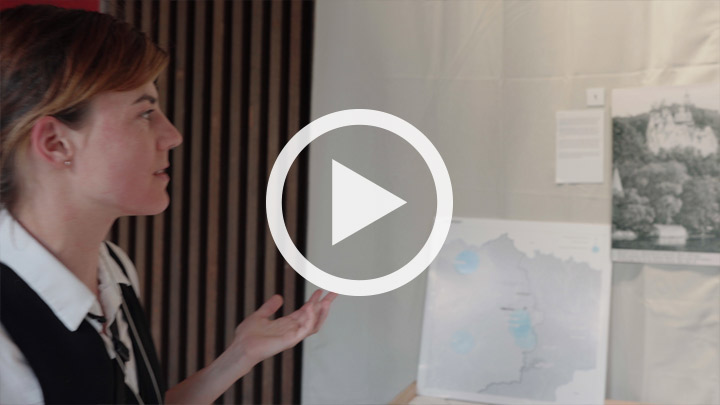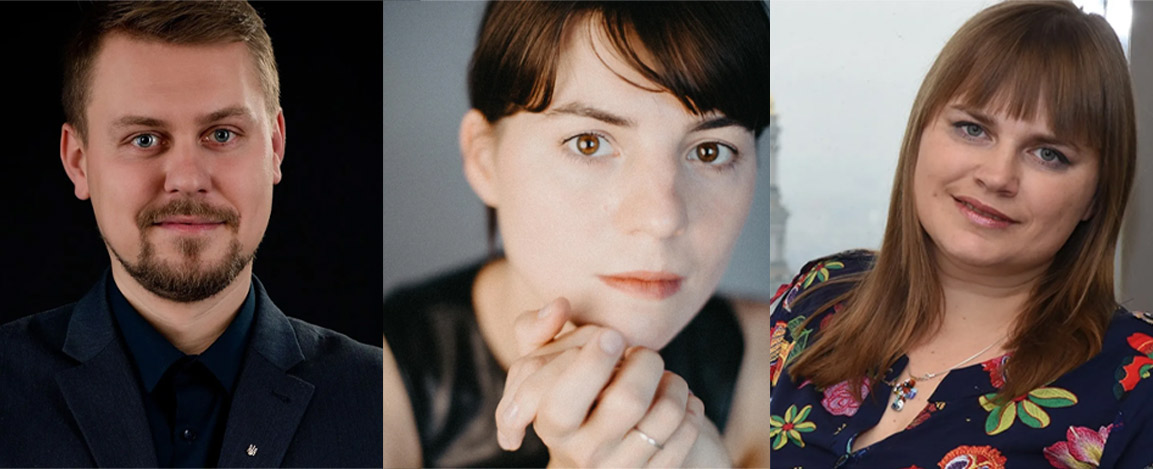Dmytro Chumachenko, Kateryna Lopatiuk, and Liudmyla Huliaieva were the inaugural participants of the Global MIT At-Risk Fellows (GMAF) program. The Ukrainian scholars arrived to MIT in the spring and were paired with faculty advisors to exchange knowledge on teaching methods and research strategies. The GMAF program is being piloted by the Center’s MIT-Ukraine Program under the leadership of Ford International Professor of History Elizabeth Wood and managing director Svitlana Krasynska. The application process for spring 2025 is open through August 1, 2024. The experiences and work of the first cohort of GMAF fellows at MIT are featured here in précis.
From left to right: Dmytro Chumachenko, Kateryna Lopatiuk, and Liudmyla Huliaieva
Dmytro Chumachenko, computer scientist
Dmytro Chumachenko is a multidisciplinary scientist working at the intersection of computer science and public health. Specializing in mathematical modeling of infectious disease transmission, Chumachenko also teaches courses on artificial intelligence at the National Aerospace University Kharkiv Aviation Institute and chairs the Subcommittee on Education and Science of the Expert Committee on AI Development at Ukraine’s Ministry of Digital Transformation. His contributions have earned him a spot among Stanford University’s World’s Top 2% Scientists.
Chumachenko's decision to merge his expertise in computer science with public health arose from recognizing a gap in Ukraine's academic approach to health sciences, where multidisciplinary research is not common. In particular, in Ukraine, public health and epidemiology are treated as purely medical disciplines, with little exposure to math or computer science. Chumachenko decided to challenge this tendency by leveraging his computer science background to develop models that simulate the spread of infections, using algorithms to predict various outbreak scenarios and inform the development of public health strategies. In the GMAF program, Chumachenko found the environment at MIT particularly resonant. “At MIT, students in all majors take a combination of physics, math, biology, and other STEM courses,” he says, “but in Ukraine, public health and epidemiology, for instance, are completely medical disciplines, and professionals within it don’t have significant exposure to math or computer science.”
Since the full-scale invasion of Ukraine, Chumachenko's research has expanded to include studying war-induced migration with the Max Planck Institute, as well as studying Russian propaganda on social media with the University of Waterloo. “Russian propaganda follows very similar patterns as viruses,” he notes, adding that they are building a consortium of European and Ukrainian institutions to share insights on misinformation. His time at MIT has enriched his perspective on research priorities: “In Europe and Ukraine, I’ve seen research agendas driven by funding needs. At MIT, the focus is on solving important problems.”
At MIT, students in all majors take a combination of physics, math, biology, and other STEM courses, but in Ukraine, public health and epidemiology, for instance, are completely medical disciplines, and professionals within it don’t have significant exposure to math or computer science.
The invasion poses a critical threat to Chumachenko’s team. “My top priority is not losing my research team,” he says. “We need external help, as our national funds are directed to defense.” He is also aiding Ukraine’s education system through a German DAAD-funded project for Kharkiv faculty to provide online education. “My campus in Kharkiv was hit by 160 Russian missiles,” he says, noting schools have moved operations underground. At MIT, Chumachenko aims to bridge Ukrainian academia with Western partners. “Researchers and teachers in Ukraine need international support, not only in collaboration but also in funding,” he says, adding, “Funding people inside Ukraine is more important than opportunities for visiting scholars like the one I have here.”
To maximize the funds going to his colleagues in Ukraine, Chumachenko does not take a salary for several of the aforementioned initiatives he leads. Chumachenko also emphasizes the need for awareness. “People here are surprised by the conditions faced by their counterparts in Ukraine,” he says, noting that although Ukraine is less frequently in the headlines today, the war continues to rage on with devastating impacts. He adds that Ukraine has become a hub for rapid innovation, reducing the AI defense product development cycle from two years to 28 days. “We have unique and valuable experience to share,” he says, emphasizing the importance of not letting Ukraine’s new capabilities go to waste.
Kateryna Lopatiuk, urban researcher
Kateryna Lopatiuk is an urban researcher dedicated to advancing a circular economy in Ukraine through her work with nonprofits, ReThink and the Ro3kvit Urban Coalition. “These are very horizontal initiatives that invite people from different backgrounds and experiences globally, many of whom are based in Ukraine,” she says, noting that some members of the MIT community have participated in recent years.
Lopatiuk graduated with a master’s in architecture from Kyiv National University of Construction and Architecture (KNUCA) in Ukraine in 2013 and worked for five years in an architecture studio before starting her own practice in urban research. “At some point, I realized that although I could make a good living with this [commercial] trajectory, it was harder to envision making a real impact in the future,” she recalls. This led her to join the European Architecture Student Assembly (EASA), a movement that unites students from 50 countries globally. “Within this movement, we started organizing events in Ukraine, trying to leverage the capacities of local communities,” she says. One notable project was a month-long event in Slavutych, near Chornobyl, where 150 participants from around the world engaged in tactical urbanism workshops within an abandoned building, investigating community needs. This experience solidified her desire to focus on broader urban development.
Lopatiuk primarily focused on co-teaching a course called “Circular Recovery Strategies of Wartime Ukraine” with Elizabeth Wood, Ford International Professor of History at MIT.
Lopatiuk’s recent shift in focus to sustainable urban reconstruction efforts was inspired by her experiences during the full-scale invasion of Ukraine, during which time she was a Fulbright fellow at MIT. As she witnessed the invasion's onset, her experience working with MIT’s academic community on using AI for urban spatial analysis inspired her to develop her own project, training a neural network to determine types of materials of rubble on damaged sites. This project highlighted the extensive damage from the invasion and the vulnerability of Ukrainian cities to climate change with a case study of Bucha in the Kyiv region. “The consequences were huge, and Ukraine was not prepared,” she says. Recognizing the need for better assessment tools, Lopatiuk, along with her partner, Herman Mitish, a full-stack developer at an MIT startup OPT Industries, secured funding from the Kyiv School of Economics and the nonprofit ReThink. They began working on analyzing and researching circular practices in Ukraine with the help of AI and satellite imagery analysis. Since then, Lopatiuk has contributed to several projects on circular economy and urban research.

As a GMAF fellow, Lopatiuk primarily focused on co-teaching a course called “Circular Recovery Strategies of Wartime Ukraine” with Elizabeth Wood, Ford International Professor of History at MIT. “The course provided historical context on the small town of Sviatohirsk, which is 30 km from the frontline and had been heavily damaged after being occupied for three months,” she explained, adding that the administration of the town is looking for people who are willing to work towards a better future for the area despite the ongoing danger. Collaborating with nonprofits, the course aimed to develop and raise awareness of recovery strategies. “We felt that with the nonprofits, we could try to develop some of the ideas or at least bring awareness to other people about the necessity of working with communities like Sviatohirsk,” says Lopatiuk. The seminar culminated in an exhibit, “Roots of Resilience: Ukraine,” launched in May at MIT Gallery 9 located in the lobby of MIT building 9. To experience the exhibit, watch the video featured above.
Following her fellowship, Lopatiuk says that she plans to apply for PhD programs in urban research and design. Her long-term goal is a combination of teaching and continuing to work with NGOs on the reconstruction of Ukraine. “Since I’m not at the front line or in the army,” says Lopatiuk, “I feel a responsibility to those who are giving their lives for me. I will continue to dedicate my efforts to helping Ukraine as much as I can in the field where I am proficient.”
Liudmyla Huliaieva, economist
Before the February 2022 invasion, economist Liudmyla Huliaieva excelled in various professional and community roles in Kyiv. She was an associate professor with a PhD in economics at the Academy of Work, Social Relations, and Tourism, a consultant specializing in grants, fundraising, and project management. In addition, she volunteered for educational and social projects aiming to support people in challenging circumstances, such as internally displaced persons, veterans, and military families. Since 2014, she has been deeply committed to aiding internally displaced persons and people with disabilities. Her research focused on the financial sector of the EU and Ukraine, sustainable finance, banking, and inclusion.
But Russia’s current war in Ukraine marked a turning point. “I thought about giving up my academic work because it seemed unimportant and unnecessary, especially in the first months of the war,” Huliaieva recalls. In April 2022, as Russian troops retreated from the outskirts of Kyiv, she went to Poland with her son for an Erasmus project meeting. “The future was utterly uncertain,” she says. During her stay, Huliaieva came across an announcement about the Polish Institute of Advanced Studies PIASt program for Ukrainian scholars at risk and was selected as an associate fellow for 2022-2023. Her research began shifting to the economic and social situation of displaced women in Ukraine and Poland. “Seventy to eighty percent of the forced migrants from Ukraine during the war are women,” she notes. “Host countries often do not understand the specific needs of women, especially mothers with children. Applying gender-sensitive approaches must become more significant in migration policy.” In addition to her research, Huliaieva began actively assisting Ukrainian women migrants. In October 2022, she co-founded the Fundacja Międzynarodowe Centrum Dialogu, Innowacji i Przyszłości, a non-profit in Poland supporting Ukrainians and promoting Ukrainian culture. The organization helps migrant women access the Polish job market through skill development and integration support. Additionally, Huliaieva, along with a team of like-minded individuals, launched a project to enhance the digital competencies of youth to combat fake news and manipulation on social networks.
As a GMAF fellow at MIT, Huliaieva is working on a research project on "The financial status of Ukrainian women forced migrants in the context of the war in Ukraine: Building the path to financial independence." This project involves interviews, focus groups, and surveys of female Ukrainian migrants in Boston. She values the program's personalized approach, which allows fellows to prioritize their own activities and projects. “The GMAF program is unique due to its individual approach, providing complete freedom for me as a researcher to choose activities that are a priority for me,” she says. She has enjoyed attending courses and events at MIT and the Center for International Studies. “I have formed a wide circle of wonderful acquaintances with American researchers, which provides opportunities for mutual collaboration,” she notes. In addition to her research project, Huliaieva plans to incorporate what she has learned into her teaching at a Ukrainian university.
Expressing gratitude for the support received during her fellowship, Huliaieva says, “I have been deeply touched by the kindness of people.” She specifically mentions Krasynska and Professor Wood: “They have not only opened the doors of MIT to us but also their hearts to the program participants. Additionally, I am sincerely grateful to my mentor, Simon Johnson, who, despite his busy schedule, always finds time to support my research." Johnson is the Ronald A. Kurtz (1954) Professor of Entrepreneurship at the Sloan School of Management at MIT.




